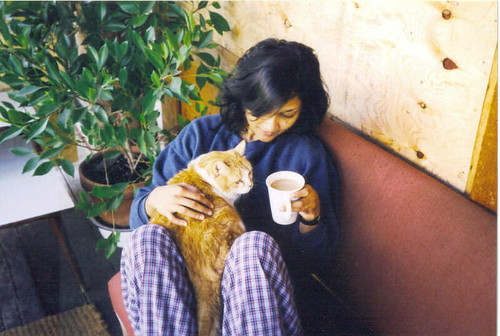The Hunger Games Trilogy

The Hunger Games,
Catching Fire,
Mockingjay
by Suzanne Collins
The Hunger Games has received rave reviews and justifiably so. It certainly is a page-turner, with interesting premise and memorable characters.
Even if quite gory (for the young adult at least), it seems to be within the expectations of what a fantasy-minded reader might accept, considering the new rules of survival in the new world.
Somewhere in the future man has totally obliterated all the wondrous things he made in his world. Panem is what survives this destruction, with isolated pockets of civilization struggling to stay alive with some sort of central power controlling their lives with an iron grip and callous heart.
Almost all fantasy fiction relies on an unlikely young hero/heroine who inadvertently rises to the challenge (whatever it may be), is favored by Destiny/Fate, manages to survive, and uphold truth, justice and what-not. Sometimes, the hero(ine) is not all that noble, not even well-equipped to deal with the devious adult minds, but they learn fast and adapt.
Katniss Everdeen is one such quick-learning survivor, even if terribly young and naive at the beginning. And we end up loving her as the book progresses, despite her sometimes-ambivalent nature, and her flippant attitude towards self-preservation. With a doll of a younger sister, and a barely-there mother who is struggling to cope with the loss of her husband, Katniss exhibits practical smarts by doing whatever it takes to keep her family alive.
There has to be some sort of triangle as far as emotional entanglements go, in order to add to the already confused heroine's list of woes. And that's where Peeta and Gale come in. A soothing, inherently nice son of a baker, and a cold, cynical hunter who bears the responsibility of feeding and keeping his family alive after his father's death.
The Hunger Games itself is a terrifying annual event that Suzanne Collins has set up in great detail. It is a cruel game with barely any rules, created, controlled, and manipulated by the Gamekeepers. And it is televised live (edited where suitable), with some parade and interviews and theatrics making it look like a carefully staged production of a reality show.
Two children from each of the 12 districts gather to fight for their lives, killing off the others in the process. Only one will be the victor in the end, alive and allowed to live the rest of his/her life out in relative peace.
Even that is not guaranteed, as Katniss and Peeta find out. Do they make it to the end? Does their love for each other help them stay rooted to what little reality they can perceive to stay sane enough to function? This is certainly not a romantic fantasy by any stretch.
All that poverty and misery in the district dwellers' lives makes it quite heart-wrenching, for, when we give up our freedoms slowly and willingly, before we know it, we have signed off our dignity and self-respect and most of all, courage.
There was something about the end, in the Mockingjay book, that seemed a little misplaced, abrupt, and contrived for me. It read like a movie script, which in itself is not bad, but, when half way through a movie we realize this must be the last reel as things are wrapping up, we find reel after reel of elaborate prolongation that seem to add little to the plot. But, that's just me.
One of the acceptable evils of fantasy is the fluid lines of morality. The hero/heroine has to uphold justice (or what they see as truth) and in order to do so, they have the license to maim, hurt, even kill as best as they can, for their own survival is at stake and that is what most beings are programmed to do: Self-defense.
The first two books in the trilogy focused on the games, the characters, their survival. But the third book shifts gears to reveal Katniss has been a pawn in a much larger scheme that power-mongers played without mercy or remorse. Mockingjay also explored the severe psychological effects on the survivors of the Hunger Games.
Stacking up the odds against the hero(ine) impossibly high and then managing to somehow extricate them from hopeless situations is possibly overdone, but that is also what makes some of the characters memorable in the fantasy fiction. Not because they have some special powers, but because they use what they have to do what it takes.
All in all, very entertaining; somewhat thought-provoking, as it is possible that humanity could end up self-destructing on purpose; and very readable.
[image source: www.wired.com]
Labels: book review, fantasy, fiction


3 Comments:
Good God Sheela! Some 4th graders I know are reading this!! I am shocked.
OMG, utbtkids, I do not believe a very young audience is ready for this sort of desensitization... but that's just me. It *is* a gory and violent world in the book, intentionally so.
With the release of the movie, it is quickly becoming a must read for the 4+ graders :(
"desensitization" indeed. Commend you on the use of that word.
Post a Comment
<< Home